As the UK’s chief rabbi and Israel’s president attend King Charles’ coronation this Shabbat, a look at the ties that have historically bound the Crown to its Jewish subjects
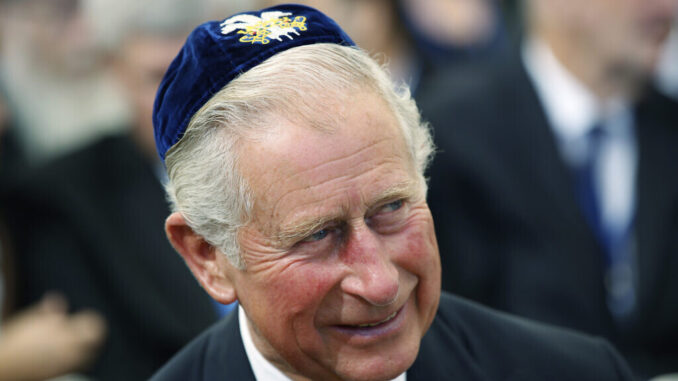
LONDON — When Queen Elizabeth II’s seven-decade-long reign ended with her death at 96 last September, her son, Charles, immediately became King.
On Saturday, however, King Charles III and his wife, Queen Camilla, will be formally crowned at Westminster Abbey.
He’ll be the 40th monarch to be crowned at the abbey in a line that stretches back 900 years to William the Conqueror’s coronation on Christmas Day 1066.
And Britain will do what it arguably still does best: put on a diamond-drenched, ermine-laden and golden-hued royal show topped with all the pageantry and ceremony, pomp and circumstance and ancient traditions it can muster.
It’s a Christian service – largely unchanged for the past 1,000 years – in which the King will take the oath, be “anointed, blessed and consecrated,” and have St. Edward’s Crown, which was made for King Charles II in 1661, placed upon his head.
But there’ll also be some Jewish details — such as Chief Rabbi Ephraim Mirvis participating in the ceremony at Westminster Abbey on Shabbat morning, a Jewish tailoring firm providing uniforms, and three Jewish composers penning new music in the king’s honor — befitting the community’s close and comfortable relationship with the Royal Family.
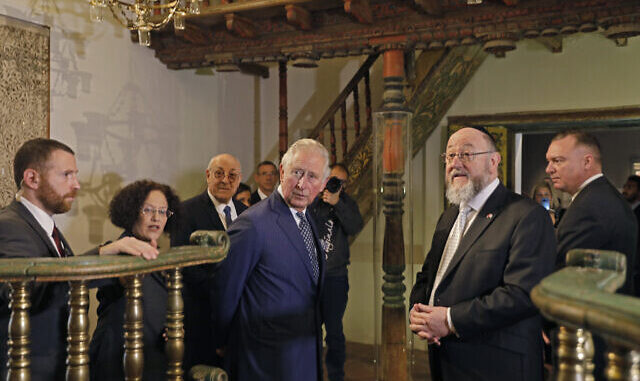
Britain’s Jews have ties to the Crown dating back to the Royal Family’s earliest years. Here are seven historical tidbits — not all of them rosy — linking the kingdom’s Jewish subjects to its monarchy.
1. Charles in Israel
While his mother, the late Queen Elizabeth II, never visited Israel (the monarch’s overseas visits take place on the advice of the government), Charles paid his first-ever official visit to the Jewish state in 2020. By this point in the late Queen’s seven-decades-long reign, her heir had taken on the burden of overseas travel.
It wasn’t Charles’s first visit to Israel; he had made private visits to attend the funerals of Yitzhak Rabin and Shimon Peres. However, it was the new heir to the throne, Charles’ eldest son, William, who blazed the royal trail to Israel. In 2018, William, who now has the title of Prince of Wales, paid the first-ever official visit to Israel by a member of the Royal Family.
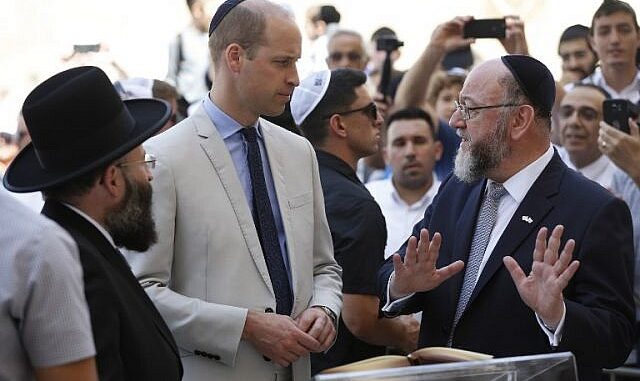
Britain’s Prince William (C), British Chief Rabbi Ephraim Mirvis (R) and Western Wall Chief rabbi Shmuel Rabinovitch (L) talk during a visit to the Western Wall, the holiest site where Jews can pray, in Jerusalem’s Old City on June 28, 2018. (AFP PHOTO / POOL / ABIR SULTAN)
2. Opponent of hate
It was fitting that Charles’s first official visit to Israel was to attend the World Holocaust Forum. The King has been a longstanding and vocal opponent of antisemitism, as well as involving himself in Holocaust commemoration and education as an active patron of the Holocaust Memorial Day Trust (a role he took over from the late Queen in 2016). In January, Charles issued his first message since becoming King on his mother’s death marking the UK’s annual Holocaust Memorial Day. The message spoke about his many meetings with Holocaust survivors.
“Over many years, I have been deeply touched to have met so many Holocaust survivors, all of them extraordinary people who faced unimaginable horror,” he said. “Their strength and determination to share their testimonies is an inspiration to us all. These are people who, despite having suffered so much, have gone on to live the most incredible, flourishing lives in the United Kingdom, and made a remarkable contribution to British society and public life.”
To mark Holocaust Memorial Day last year, Charles unveiled seven portraits of survivors he had commissioned. At the unveiling ceremony, 98-year-old Lily Ebert told him: “Meeting you, it is for everyone who lost their lives.” Touching her shoulder, Charles replied: “But it is a greater privilege for me.”
3. Running in the family
Charles’s interest in the Holocaust is personal. In 1993, his grandmother, Princess Alice of Battenberg, was awarded the title of “Righteous Among the Nations” by Yad Vashem. Alice, the mother of Charles’s father, the late Duke of Edinburgh, was a member of the Greek royal family who was living in Athens when the Nazis occupied the city during World War II. Alice subsequently sheltered Rachel Cohen, widow of Haimaki Cohen, a former member of Parliament and ally of the royal family, and two of her children, at her royal residence.

German tanks roll through Athens, 1943. (CC BY-SA 3.0/ Bundesarchiv bild via Wikimedia Commons)
According to Yad Vashem: “There were times when the Germans became suspicious, and Princess Alice was even interviewed by the Gestapo. Using her deafness, she pretended not to understand their questions until they left her alone.”
“She saved the whole family,” Evy Cohen, Cohen’s granddaughter later said. “Clearly I wouldn’t be alive, I wouldn’t be here, I wouldn’t be born if it hadn’t been for her.”
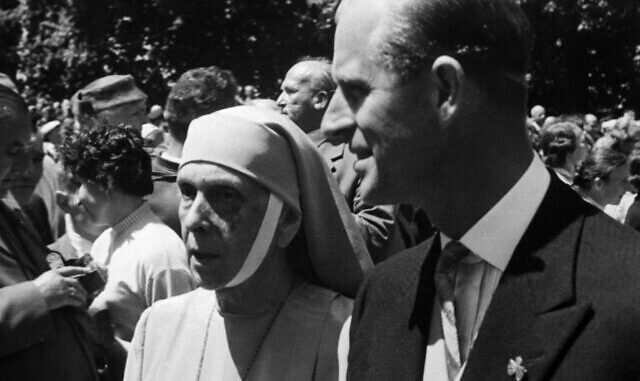
Britain’s Prince Philip escorts his mother, Princess Alice Andreeas of Greece, in the wedding procession of Princess Margarita of Baden and Prince Tomislav of Yugoslavia after the religious ceremonies on June 5, 1957 at Salem, Germany. (AP Photo)
In 1994, the Duke of Edinburgh traveled to Jerusalem to plant a tree in his mother’s honor.
“I suspect that it never occurred to her that her action was in any way special,” he said at the time. “She would have considered it to be a perfectly natural human reaction to fellow beings in distress.”
Alice, who later founded a nursing order of Greek Orthodox nuns, is buried on the Mount of Olives. Like his father, Charles has visited Alice’s gravesite and he’s spoken of his “immense pride” in her actions.
4. Oil from the Holy Land
The anointing oil, or “chrism,” that will be used during the coronation ceremony has traveled from afar. Created from olives harvested from two groves on the Mount of Olives, it was consecrated in a ceremony at Jerusalem’s Church of the Holy Sepulchre in March conducted by the Patriarch of Jerusalem, His Beatitude Patriarch Theophilos III, and the Anglican Archbishop in Jerusalem, The Most Reverend Hosam Naoum.
“The olives were pressed just outside Bethlehem. The oil has been perfumed with essential oils — sesame, rose, jasmine, cinnamon, neroli, benzoin and amber — as well as orange blossom,” Buckingham Palace said in a statement. The palace added that the formula has been used for hundreds of years, a point emphasized at the time of the consecration ceremony by Welby.
“This demonstrates the deep historic link between the Coronation, the Bible and the Holy Land,” the archbishop said. “From ancient kings through to the present day, monarchs have been anointed with oil from this sacred place.”
But the relationship between Britain’s Jews and the monarchy has historically not always been so harmonious or without incident.
5. Nazi links
Charles’s great-uncle, Edward VIII, abdicated the throne in 1936 when the government wouldn’t allow him to marry twice-divorced American Wallis Simpson. But Edward, who then moved to France, married his lover, and became Duke of Windsor, has also long been the subject of rumor and speculation about his alleged Nazi sympathies. Indeed, a documentary aired on British television last year claimed he passed information to the Nazis that helped the fall of France in 1940 and encouraged Germany to bomb Britain into submission.
Whatever the truth of these allegations, the Nazis – who are thought to have planned to offer Edward the throne had they successfully invaded the UK in 1940 – had good reason to see the couple as potential fellow travelers. In the early summer of 1933, for instance, Edward confided in the Kaiser’s grandson that it was “no business of ours to interfere in Germany’s internal affairs either re the Jews or re anything else.”
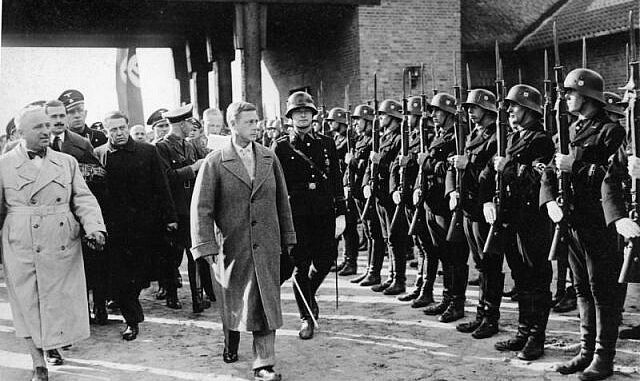
Edward VIII walks by an SS formation on a trip to Germany. (Bundesarchiv bild)
Months after abandoning his crown and country, the Duke paid a controversial 12-day visit to the Reich where he and his wife were feted by the Nazis. And as late as 1940, Edward was publicly calling Hitler “a very great man.”
That view certainly wasn’t one shared by his brother, King George VI and his wife, Queen Elizabeth (Charles’s grandparents). While their children, the late Queen Elizabeth II and her sister, Princess Margaret, were, like many others, evacuated from the capital, the couple insisted on remaining with their subjects in London during the worst of the Blitz.
6. Pogrom at the Coronation
At the coronation of Richard I in 1189, Jewish leaders attempting to bring gifts for the new monarch were attacked. An orgy of violence followed which saw Jews fleeing to the Tower of London to seek shelter. The 12th-century chronicler and diplomat Roger of Howden recorded that only those Jews who hid in the royal citadel or in the homes of friends escaped death.
“The crusade fervor of the late 1180s was likely the driving factor in the massacres, combining with the already present anti-Jewish prejudice, economic resentment and opposition to the crown’s relationship with the Jews,” historian Dr. Rory MacLellan said recently.
7. A royal expulsion and a republican return
Legally, Jews in Medieval England were viewed as the property of the Crown. Seen as a valuable cash cow, royal officials were cynically charged with protecting Jews from the mob – while also ensuring they paid up arbitrary taxes as and when the king needed them.
This uneasy relationship came to a close in 1290 when King Edward I signed the Edict of Expulsion. Financially drained by exploitative taxation, the community’s ability to contribute to the cash-strapped monarch’s coffers had been severely dented. Edward thus ordered that all Jews in England – some 3,000 in all – either convert or go into exile abroad.
Jews didn’t return to England until the 1650s when they were invited to resettle by parliamentary leader Oliver Cromwell during England’s brief – and unhappy – flirtation with republicanism.



Peloni-
I understand your faith in the historian, and you are most likely correct. I know that Richard’s was the first coronation of which we have a complete description. I also know that he was crowned in Westminster Abbey having come from Normandy the previous day. Possibly, in my considered opinion, he was not even aware of the pogrom, the major part of which was carried out after he left on Crusade (and sporadically continued for the next many years until 1290.. He’d arranged the Crusade BEFORE he was crowned. The hangings were only a handful, being not properly investigated . The king was wrapped up in receptions, dinners at a variety of Great Noble Houses, and receiving a great number of dignitaries, which would have taken days.
History says that the riots and subsequent Jew murders were actually-in a way- caused by Jews, They were forbidden to attend the coronation, but DID attend, (a few of them) and were ejected from the hall. This led to rumours that Jews had attempted to kill the king.
The Jews being the King’s PROPERTY, was the reason that the few ringleaders were executed. Not because of any good feeling for the Jews.
Over the past month I have been reading a History of England with a focus on the Wars of the Roses. It was surprising to me all over again how little live was valued and how easily and quick it was to condemn, hand or behead all and sundry.
So for the ringleaders to have been hanged was a simple matter and may have ben ordered by a minor dignitary/. I am speculating here but I have done much reading over many years concerning Royal and subordinate powers over the common man.
Consider the reasons for that vicious, brutal war I’ve just mentioned, caused because of differences between the dates of birthdays of the children of John of Gaunt, a Duke, himself never a king.
And all lost eventually to illegitimate descendants of John by his mistress, and further muddied by the liaison of a widowed Queen mother with a Welshman named Tudor, a part of her retinue.
@Edgar
I recall having read it more than once, but the citation that I can share at the moment would be from the Richard biography by John Gillingham. The hangings reportedly took place the day following Richard’s coronation. So, whereas no one would seriously contest the notion that Richard was an absent king, a reference describing his reign by more than one of his biographers, he was certainly present at the time of London pogrom which took place specifically because of his coronation. Looking up the exact quote by Gillingham, he states taht the
I find Gillingham to be a well researched author, but I have my own inflections on works which are well researched, so feel free to offer a correction if you are aware of some differing context of the matter.
As to the matter of Richard personally playing a role in the matter, I don’t suggest that he personally arrested anyone or personally hanged anyone, just that he ordered it done as any king would do.
PELONI-
I don’t know where yoo heard that Richard (personally?) rounded up the pogrom leaders and hanged them in London . As I noted elsewhere, In his reign of 10+years he spent less than a total of 9 months in England. This is historical, confirmed fact……
@Edgar
Fairly noted and an important consideration to emphasize.
The story that Richard ! protected Jews etc in a post on this page is nullifiedby his capture of Jerusalem where contemporary historians write that “their horses were up to their hocks in blood, both Jewish and Muslim”.
Richard was a Crusader, emblazoned by a Cross on his outer garments, and sworn to that creed. Whatever mythical Jewish Blood it is “suggested” he had was very faint, if not invisible altogether.
Ine must remember if One even knows, that of his 10-12 year reign he spent a total of LESS than 9 months in England. He was not interested in England at all. Any edicts he made re England are very few and far between.
This is a historical fact which surprised me when I first read it, but confirmed many times, Hollywood notwithstanding.
The story that Richard ! protected Jews etc in a post on this page is nullified by his capture of Jerusalem where contemporary historians write that “their horses were up to their hocks in blood, both Jewish and Muslim”.
One always forgets or doesn’t know , that of his 10-11 year reighn he spend less than 9 months TOTAL in England, more interested in hi European possessions and in Crusading. Hollywood movies notwithstanding.
He was King of England only in name and made few if any edicts or declarations whih affected that Land.
Richard was a Crusader, emblazoned by a Cross on his outer garments, and sworn to that creed. Whatever mythical Jewish Blood it is “suggested” he had was very faint, if not invisible altogether.
This last sentence is a direct LIE. Oliver may have invited them, But strange as it is, He did not have the power to do so. He was one of a 5 man Directorate ,although the most important, and I have a historical account of the meeting where Oliver spoke for their return but was refused by the 4 others.
How they came back is a story of interest .England’s wealth was in her sheep fleeces and other exports. -.mainly WOOL,It had been for many centuries. the only outlet was to the merchants of Flanders who were all Jews. To facilitate trade, some Jews built holding warehouses on the Thanes docks, and they would come over to supervise and transact their business. They would stay from days to eventually weeks. As no one seemed to care, they very slowly and gradually brought their families over to stay with them, more and more until a Jewish Community was visible. This gradually increased without much protest, and
LO and Behold, England had a Jewish Community again
They were still under the Royal Ban and the Jews under the Rabbinnic Herem of 1290, and still are to this day.
LOOK it UP if you feel you need confirmation Several books have been written about thtis, all deeply researched .
And the roots of the British Royal Family have changed several times, there were Plantagenets, including Yokists and the Lancastrians. who won the Civil war between them, There was Dutch King William, and then the line changed to the -Saxe-Coburg, which, during WW1 changed it’s name adopted Windsor, and negated out the German side.
{but they are German in origin and deeply intermarried to German royal families}
Poor Sophia Dorethea who was the wife of George 1 a very brutal man, who spoke NO English was imprisoned in a walled up tower in Europe for over 30 years because of her eventual love affair with Count Konigsmarck who was murdered and body vanished. She was a direct ancestor of the present Windsor line.
Her son George 2 never bothered about her nor had her released after death of his father. A really brutal self centred bunch.
British Royal History is drenched with blood- much of it innocent.
George 3 , the Mad King, was the first British Royal to be born in England, in the mid 1750s. His madness gave rise to the era of “The Prince Regent”, later George 4th ine of England’s most licentious and depraved monarchs. His niece Victoria became Queen after his youngrt btother William 4th died in 1837.
@Liz
It is an interesting theory, but I find it hard to believe, to be honest.
Richard’s support of the Jews extended from the era of his father who signed two charters in recognition of the rights and protections extended by the crown to Jews of England. These privileges were in existence during the age of Henry I, prior to the Anarchy of Steven and Maud, but were not placed into a charter til the age of Henry II, and which was later reaffirmed by both Richard and John when they were anointed to the throne.
Despite this fact, though, it should be noted that while the Jews of Richard’s Normandy lived in peaceful security, the Jews of much of the rest of Christendom experienced the heighten ills of antisemitism associated with the religious blood lust of Crusade.
Indeed, Richard Lionheart responded to his public’s thirst for Jewish blood in quite a distinct manner from that of his counterpart in France who had evicted the Jews from his royal lands some years previously. When the Jews brought gifts to Richard’s coronation, a pogrom commenced outside the proceedings leading to the torching and butchery of the Jewish quarter in London. The following day Richard rounded up the leaders of the pogrom and hung them. He also reversed the forced conversion of at least one of those baptized during the pogrom. Following this, he placed the Jews under his personal protection issuing orders to every shire in England that the Jews should be left in peace. He likewise issued orders instructing the same to both Normandy and Poitou.
This did not, however, prevent the popular extension of pogroms to other areas of England, culminating in the 1190 Massacre at York. Following the violation of the King’s edict protecting the Jews in York, a royal inquiry took place, resulting in a fine being levied on the city by the King, but no justice was ever brought against those who were well known to have been the instigators in the violence, including Richard Malebisse and William Percy, despite the fact that these were both known to be out of favor with Richard when they violated his protections over the Jews.
Again, this was the eve of Richard’s Crusade in the Holy Land, and antisemitism was rising across all of Christendom. Indeed, the fact that the public ignored Richard’s edict protecting the Jews, as well as the fact that Richard ignored the fact that his edict had been ignored, likely both speak to the reality in which Richard ruled.
But the caveat of this popular support of antisemitism during Richard’s rule would indicate a clear lack of support that Richard, himself, was ever suspected of being a Jew by his contemporaries. Perhaps there is some truth to the theory, and it was a well kept secret at the time, but the evidence supporting the belief is due to terms applied to Richard’s bastardhood and the occupation of his mother’s family, both of which were well known facts at the time. Hence, if these facts are correctly deciphered nearly a millennium later, it is likely that the suspicion of his heritage, regardless of its truth, would have been known at the time and used against Richard at some point during his tumultuous life, but there is not even a hint of such suspicions of his Jewish origins, not even by sources beyond his influence in other lands.
Consequently, though these are just some personal observations which I find persuasive, I find the conjectured that Richard may have been a Jew to be highly unlikely given the circumstances of the age in which he lived.
William the Conqueror, our first Norman king, may well have been Jewish. He was known as “the Bastard”, because his father and mother were not married, and it is thought that his mother was Jewish. She was the daughter of a tanner, and almost all members of that profession at the time were Jewish. Moreover, William was very generous to the Jews in his kingdom and in his court, and invited Jews to come to England. As long as he reigned, they were protected.
https://media.gettr.com/group4/getter/2023/05/07/01/81c88b5b-e718-ec99-0eb5-e6b8a263ac74/bfca89eeb48c6ff93e68e62c0b534a27_768x0.jpg
Is there a contest in progress here?
PS Did anyone notice the Ukrainian colors at the coronation?
https://www.telegraph.co.uk/content/dam/royal-family/2023/05/06/TELEMMGLPICT000334597629_trans_NvBQzQNjv4Bqgw3loNdQnsESclBnw2zx2vqsXeADq7Zg0zkjibYou0Q.jpeg?imwidth=680